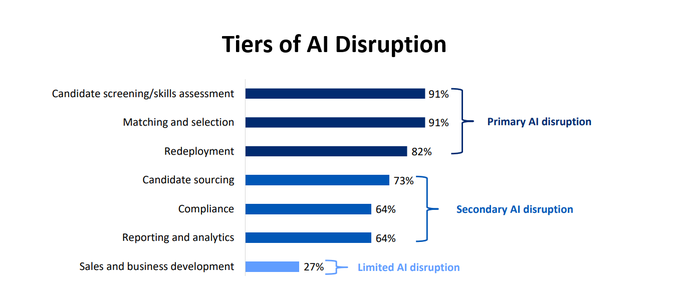“I didn’t know what to expect, but Al has come a long way!” said one. “[It’s] really nice to get a call early just to touch base with someone.”
AI is on track to replace at least 25% of current activities in candidate screening and matching within three years, according to SIA research. With a 75% candidate satisfaction score, ConverzAI illustrates how predictions about AI’s role in recruiting can come to fruition.

A Meaningful Experience
“Transparency immediately sets the tone of trust,” says Ashwarya Poddar, founder and CEO of ConverzAI. “At the beginning of a spam call, you hear all kinds of nonsense. But if the opening is, ‘This is a virtual recruiter for your job application, trying to help you get a job,’ it’s pretty transparent.”
Latency. Immediacy is crucial in human conversation, and achieving this in real-time voice AI is challenging.
Accuracy. Once the candidate agrees to speak with the virtual recruiter, the solution needs to be able to carry on a conversation — and that requires comprehension.
“In the past, a lot of the technology output would take you to a point where, as a human being, you’re frustrated,” Poddar says. “You’re saying something and the bot on the other side is understanding something else. And so you want to press a button to get out of this conversation.”
“Once you have meaningfulness in the conversation, people open up and talk like they would talk to anybody else,” Poddar says. When AI strikes a good balance between trust accuracy and latency, candidates can have meaningful conversations, Poddar adds.
In Their Words
Candidates appreciate the technology’s speed and transparency. Nine out of 10 surveyed liked the immediate response the virtual recruiter provided.
“It was a great tool to help streamline the interview process,” said one candidate. “I’m very impressed with the clarity and types of questions asked!”
Appealing Contact
Candidates appreciate the technology’s speed and transparency. Nine out of 10 surveyed liked the immediate response the virtual recruiter provided.
Just because you never created an experience for a candidate doesn’t mean that experience is good,” says Ashwarya Poddar, founder and CEO of ConverzAI. “In fact, not creating [a candidate] experience is very, very bad.”
Fairness. A virtual recruiter handles conversations in a consistent way — and candidates know this. They each will have a similar experience. This reliability reduces variations that can occur due to fatigue or haste.
“There’s an element of fairness that comes into play,” Poddar says. “It’s a level playing field.”
Expanded opportunities. One of the best experiences a candidate can have with a staffing firm, if they don’t get the job they applied for, is to be considered for other positions. AI-powered virtual recruiters make this possible at scale.